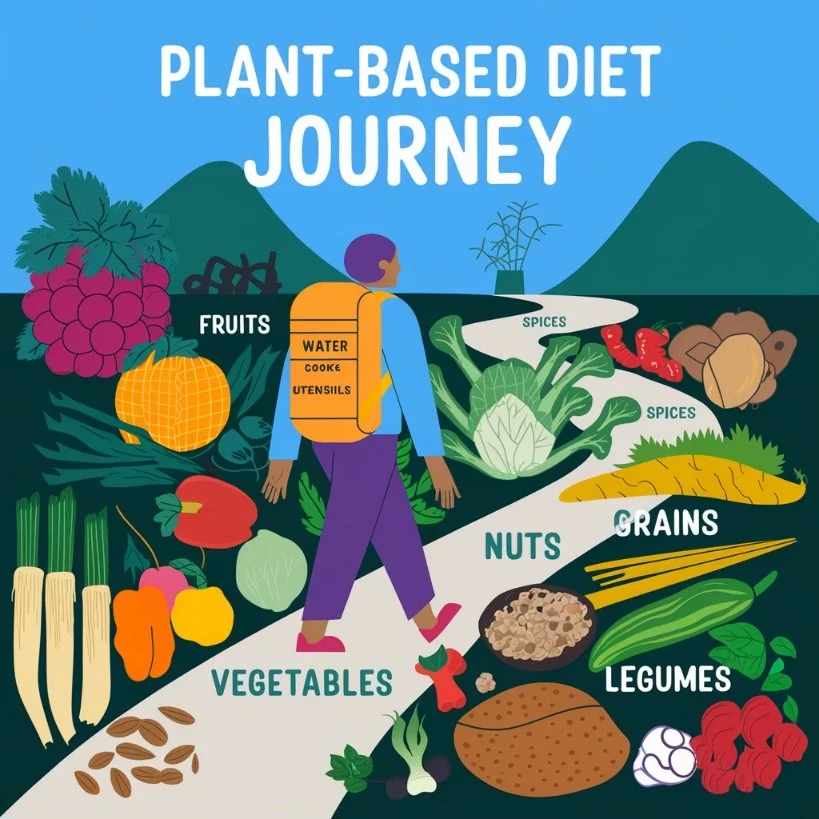Myth-Busting Facts About a Whole Food Plant-Based Diet
Myth-Busting Facts About a Whole Food Plant-Based Diet
Welcome to a journey toward vibrant health and well-being! As a Seventh-day Adventist Traditional Naturopath, and Functional Diagnostic Nutrition® Practitioner, I'm passionate about helping people discover the incredible power of natural, plant-based nutrition. One of the most compelling examples of the benefits of this lifestyle comes from the Blue Zones—regions of the world where people live the longest, healthiest lives. In these communities, like Okinawa, Japan, and Loma Linda, California, a predominantly plant-based diet is a cornerstone of longevity and vitality.
In this space, we'll explore practical, science-backed insights, and dispel common myths about plant-based nutrition, showing you that you don't need animal products to thrive. Together, we'll uncover the secrets to living your healthiest, happiest life—naturally, and in harmony with the wisdom of the world's longest-living cultures.
Fun Fact:
A fun fact about a whole food plant-based diet is that it can lead to a significant increase in energy levels. Since this diet emphasizes nutrient-dense foods like fruits, vegetables, whole grains, and legumes while avoiding processed foods, it provides your body with high-quality fuel. This can result in feeling more energized throughout the day, with many people reporting better stamina and quicker recovery after exercise. Plus, the diet's high fiber content keeps your digestive system running smoothly, which also contributes to overall well-being and vitality.
Myth #1: You Need Animal Products to Avoid Malnutrition
Fact: A well-planned whole food plant-based diet provides all essential nutrients except for vitamin B12, which can be easily supplemented.
Explanation: One of the most pervasive myths is that a plant-based diet cannot meet all of your nutritional needs, leading to malnutrition. However, this is simply not true. Whole plant foods like fruits, vegetables, legumes, nuts, seeds, and whole grains are packed with vitamins, minerals, fiber, and phytochemicals that support overall health. The only nutrient that needs supplementation is vitamin B12, which is not produced by plants but is essential for nerve function and red blood cell formation.
Evidence: The Academy of Nutrition and Dietetics states that appropriately planned vegetarian and vegan diets are nutritionally adequate and may provide health benefits for the prevention and treatment of certain diseases . The Adventist Health Study-2, which analyzed the health outcomes of over 96,000 Seventh-day Adventists, found that those who followed a vegetarian diet, especially a vegan diet, had lower rates of heart disease, diabetes, and certain cancers compared to those who consumed meat.
Myth #2: Animal Products Are Necessary for Gut Health
Fact: A plant-based diet, rich in fiber, is superior for gut health and promotes a diverse and balanced gut microbiome.
Explanation: The gut microbiome is made up of trillions of bacteria and other microorganisms that play a crucial role in digestion, immune function, and even mental health. Fiber, found abundantly in plant foods, is a key nutrient for feeding the beneficial bacteria in your gut. These bacteria ferment fiber into short-chain fatty acids (SCFAs), which support gut health and reduce inflammation.
Evidence: Studies show that a diet high in fiber from plant-based sources is associated with a more diverse microbiome, which is linked to better overall health. Conversely, diets high in animal products and low in fiber can disrupt the balance of gut bacteria, leading to dysbiosis and increased risk of conditions like inflammatory bowel disease (IBD).
Myth #3: Animal Products Are Necessary for a Healthy Sex Steroid Hormone Cascade
Fact: A whole food plant-based diet supports a healthy hormone balance, including the sex steroid hormone cascade, without the need for animal products.
Explanation: The sex steroid hormone cascade involves hormones like estrogen, progesterone, and testosterone, which are crucial for reproductive health, sexual function, and overall vitality. There’s a common misconception that animal products are essential for maintaining these hormones at optimal levels. However, consuming a diet rich in whole plant foods can provide the necessary nutrients to support healthy hormone production and balance.
Evidence: Plant-based diets are rich in phytonutrients, such as lignans found in flaxseeds, which have been shown to support healthy estrogen levels by modulating estrogen metabolism. Additionally, a diet high in fruits, vegetables, and whole grains provides an abundance of antioxidants and anti-inflammatory compounds that protect the body from oxidative stress, which can disrupt hormone production.
Conversely, diets high in animal fats have been associated with increased levels of sex hormone-binding globulin (SHBG), a protein that binds to sex hormones and reduces their bioavailability, potentially leading to imbalances. A study published in *The American Journal of Clinical Nutrition* found that individuals consuming plant-based diets had lower levels of SHBG and more balanced levels of free sex hormones compared to those consuming high amounts of animal products.
Moreover, the consumption of dairy products, which contain natural bovine hormones, has been linked to disruptions in the human endocrine system. This can potentially lead to conditions like hormonal acne, menstrual irregularities, and an increased risk of hormone-related cancers.
By choosing a whole food plant-based diet, you can support a healthy sex steroid hormone cascade naturally, without the need for animal products.
Myth #4: Plant-Based Diets Cause Brain Fog and Mood Swings
Fact: A well-balanced plant-based diet can improve brain function and stabilize mood.
Explanation: Brain fog and mood swings are often mistakenly attributed to plant-based diets, but the truth is that these issues are more commonly associated with diets high in processed foods, sugar, and unhealthy fats. Plant-based diets, which are rich in antioxidants, healthy fats, and complex carbohydrates, can actually enhance brain function and mood.
Evidence: Omega-3 fatty acids, found in flaxseeds, chia seeds, and walnuts, are essential for brain health and can be adequately obtained from plant sources. Additionally, the high levels of antioxidants in fruits and vegetables help reduce oxidative stress and inflammation in the brain, which can improve cognitive function and mood . Studies have shown that individuals who follow a plant-based diet have lower levels of anxiety and depression, likely due to the diet’s anti-inflammatory properties.
Myth #5: Plant-Based Diets Lead to Mold Toxicity
Fact: Mold toxicity is more commonly associated with certain foods like grains, nuts, and coffee, but a whole food plant-based diet can actually help reduce the risk.
Explanation: While it’s true that certain plant-based foods, such as grains and nuts, can be contaminated with molds that produce mycotoxins, this issue is not exclusive to plant-based diets. Proper storage and preparation methods can significantly reduce the risk. Moreover, the antioxidants and phytonutrients found in a whole food plant-based diet can help detoxify the body and support the liver in processing and eliminating toxins.
Evidence: Studies indicate that a diet rich in vegetables and fruits can enhance the body’s natural detoxification processes. For example, cruciferous vegetables like broccoli and Brussels sprouts contain compounds that support liver function and help protect against toxin-related damage.
Myth #6: The Blue Zones’ Longevity Is Due to Animal Products
Fact: The diets of the Blue Zones—regions with the highest concentration of centenarians—are predominantly plant-based, with animal products playing a minimal role.
Explanation: The Blue Zones, including Okinawa (Japan), Sardinia (Italy), Ikaria (Greece), Nicoya (Costa Rica), and Loma Linda (California), share common dietary patterns that are mostly plant-based. These communities consume diets rich in legumes, whole grains, vegetables, and nuts, with meat and dairy products used sparingly, often only a few times a month.
Evidence: In Loma Linda, California, home to a large population of Seventh-day Adventists, many people follow a vegetarian or vegan diet. Research shows that Adventists who adhere to a plant-based diet live significantly longer than the general population, with lower rates of chronic diseases such as heart disease, cancer, and diabetes . Similarly, in Okinawa, the traditional diet consists of sweet potatoes, soy products, and green leafy vegetables, with very little meat, leading to one of the highest life expectancies in the world.
Did you know
It is a mistake to suppose that muscular strength depends on the use of animal food. The needs of the system can be better supplied, and more vigorous health can be enjoyed, without its use. The grains, with fruits, nuts, and vegetables, contain all the nutritive properties necessary to make good blood. These elements are not so well or so fully supplied by a flesh diet. Had the use of flesh been essential to health and strength, animal food would have been included in the diet appointed man in the beginning.
When the use of flesh food is discontinued, there is often a sense of weakness, a lack of vigor. Many urge this as evidence that flesh food is essential; but it is because foods of this class are stimulating, because they fever the blood and excite the nerves, that they are so missed. Some will find it as difficult to leave off flesh eating as it is for the drunkard to give up his dram; but they will be the better for the change. -EGW
Blue Zones: Living Proof of Plant-Based Benefits
Blue Zones are regions where people live significantly longer and healthier lives. These areas include Okinawa (Japan), Ikaria (Greece), Sardinia (Italy), Nicoya Peninsula (Costa Rica), and Loma Linda (California). A common thread among these regions is a diet that is predominantly plant-based.
Key Dietary Patterns in Blue Zones
🌿 High Consumption of Beans and Legumes: Beans are a staple in Blue Zones, providing a rich source of protein, fiber, and essential nutrients. For example, the traditional diet in Okinawa includes soybeans, while the Nicoya Peninsula diet features black beans.
🌿 Minimal Meat Consumption: While some Blue Zones include small amounts of meat, it is consumed sparingly. In Loma Linda, home to a large population of Seventh-day Adventists, many individuals follow a vegetarian or vegan diet, contributing to their longevity and lower rates of chronic diseases[1][2].
🌿 Whole Foods Over Processed Foods: Blue Zone diets emphasize whole, minimally processed foods. This includes a variety of vegetables, fruits, nuts, seeds, and whole grains. For example, Ikaria's diet includes a wide range of wild greens and herbs, which are rich in antioxidants and polyphenols[4].
Health Outcomes in Blue Zones
Research indicates that the dietary habits in Blue Zones contribute to remarkable health outcomes:
🫴🏾 Increased Lifespan: People in Blue Zones often live to be over 100 years old. For instance, Seventh-day Adventists in Loma Linda have a life expectancy that is 10 years longer than the average American[1][4].
🫴🏾 Lower Rates of Chronic Diseases: Plant-based diets in Blue Zones are associated with lower rates of heart disease, diabetes, and certain cancers. This is attributed to the high intake of fiber, antioxidants, and anti-inflammatory compounds found in plant foods[4].
Conclusion: Embracing the Power of a Whole Food Plant-Based Diet
The myths surrounding plant-based diets are persistent, but science and the lived experiences of long-lived populations show that you don’t need animal products to thrive. A whole food plant-based diet is rich in all the essential nutrients your body needs, supports gut health, promotes hormonal balance, and protects against chronic diseases. By focusing on a variety of whole, unprocessed plant foods, you can enjoy vibrant health and potentially extend your lifespan, much like the centenarians in the Blue Zones.
If you’re considering transitioning to a whole food plant-based diet, rest assured that you’re making a choice that is not only good for your body but also for the planet. With the right information and support, you can easily adopt this way of eating and reap the many benefits it offers.
When flesh food is discarded, its place should be supplied with a variety of grains, nuts, vegetables, and fruits that will be both nourishing and appetizing. This is especially necessary in the case of those who are weak or who are taxed with continuous labor. In some countries where poverty abounds, flesh is the cheapest food. Under these circumstances the change will be made with greater difficulty; but it can be effected. We should, however, consider the situation of the people and the power of lifelong habit, and should be careful not to urge even right ideas unduly. None should be urged to make the change abruptly. The place of meat should be supplied with wholesome foods that are inexpensive. In this matter very much depends on the cook. With care and skill, dishes may be prepared that will be both nutritious and appetizing, and will, to a great degree, take the place of flesh food. -EGW
High Protein Butter Bean Tofu Stew
This creamy, flavorful dish is ready in just 30 minutes! Packed with 32g of protein and 10g of fiber per serving, this butter bean and tofu stew is both nourishing and satisfying. Plus, it’s made with simple, easy-to-find ingredients for a hassle-free meal.
Prep Time
10 minutes
Cook Time
20 minutes
Ingredients
280g firm tofu broken up into chunks
1 tbsp cornflour or arrowroot flour
1 tbsp Gram masala seasoning
2 tbsp Avocado oil divided
1/2 onion chopped
3 garlic cloves minced or more to taste
1 can butter beans drained and rinsed
200g baby plum tomatoes slices in half or canned tomatoes
1 tsp turmeric powder
1/2 tsp chilli powder
100 ml oat cream or coconut milk
Juice of 1 lemon
Salt & cayenne pepper to taste
To serve
Fresh coriander
Chilli flakes
Rice or quinoa for extra protein
For the salad
2 tomatoes
1/2 cucumber
1 tbsp chopped onions
1/2 tbsp lemon juice
1/2 tbsp Avocado oil
Salt & cayenne pepper to taste
Instructions
Break up the tofu into chunks and place in a bowl. Add 1 tbsp cornflour, tamari sauce and gram masala, oil and toss to coat.
Place on a baking tray lined with parchment paper and bake in a preheated oven at 200°C (400°F) for 20 to 25 minutes.
Heat 1 tablespoon of oil in a pan and sauté the onions until golden and fragrant, about 5 minutes. Toss in the juicy tomatoes and garlic, letting them soften and release their rich, savory juices.
Stir in the butter beans, zesty lemon juice, velvety cream, and a medley of aromatic spices. Season generously with salt and pepper, and let the flavors meld together, simmering for 5–10 minutes. The result? A creamy, flavor-packed dish bursting with irresistible warmth and comfort.
Gently fold in the tofu, letting it soak up the rich, aromatic spices. Cook until the tofu is warm and infused with flavor, and every bite bursts with the perfect blend of seasonings.
Prepare the salad by mixing all the ingredients in a bowl.
Garnish with fresh coriander, a sprinkle of chilli flakes, rice and the homemade salad.
Health Benefits of Ingredients
Tofu 🥢: High in protein for muscles & rich in calcium for strong bones.
Butter Beans 🫘: Packed with fiber for digestion & potassium for heart health.
Avocado Oil 🥑: Heart-healthy fats & skin-loving vitamin E.
Garlic 🧄: Boosts immunity & lowers inflammation.
Tomatoes 🍅: Loaded with antioxidants for glowing skin.
Turmeric ✨: Anti-inflammatory powerhouse for joint health.
Chilli 🌶️: Speeds up metabolism & adds a spicy kick.
Lemon 🍋: Detoxifies & boosts vitamin C.
Coriander 🌿: Aids digestion & detox support.
Rice/Quinoa 🍚: Energy boost & complete plant protein.
Simple, healthy, and delicious! 🌟
Citations:
[1] https://www.healthline.com/nutrition/seventh-day-adventist-diet
[2] https://zoe.com/learn/podcast-longevity-according-to-blue-zones
[4] https://www.bluezones.com/2020/07/blue-zones-diet-food-secrets-of-the-worlds-longest-lived-people/
[5] https://www.zoeharcombe.com/2011/08/the-vegetarian-myth-lierre-keith/
[7] https://www.reddit.com/r/nutrition/comments/18zlku4/you_are_what_you_eat_netflix/
Citations for the studies mentioned:
Melina, V., Craig, W., & Levin, S. (2016). "Position of the Academy of Nutrition and Dietetics: Vegetarian Diets." Journal of the Academy of Nutrition and Dietetics, 116(12), 1970-1980. [https://www.sciencedirect.com/science/article/abs/pii/S2212267216311923]
Fraser, G. E. (2009). "Vegetarian diets: what do we know of their effects on common chronic diseases?" The American Journal of Clinical Nutrition, 89(5), 1607S-1612S. [https://academic.oup.com/ajcn/article/89/5/1607S/4596792]
Hills, R. D., et al. (2019). "Gut Microbiome: Profound Implications for Diet and Disease." Nutrients, 11(7), 1613. [https://www.mdpi.com/2072-6643/11/7/1613]
Zeng, Y., et al. (2016). "Effect of vegetarian diet on gut microbiota: an updated review." Frontiers in Nutrition, 3, 31. [https://www.frontiersin.org/articles/10.3389/fnut.2016.00031/full]
Jacka, F. N., et al. (2017). "A randomized controlled trial of dietary improvement for adults with major depression (the ‘SMILES’ trial)." BMC Medicine, 15, 23. [https://bmcmedicine.biomedcentral.com/articles/10.1186/s12916-017-0791-y]
Recipe inspired by:
https://nadiashealthykitchen.com/butter-bean-tofu-stew/
DISCLAIMER: The health information in this blog are for general education and is not intended to substitute for any medical advice. No medical cure, diagnosis, or treatment is provided.
This website contains affiliate links, which means LTL may receive a percentage of any product or service you purchase using the links in the items descriptions, articles or advertisements. You will pay the same price for all products and services, and your purchase helps support our ongoing effort in assisting you. Thanks for your support!
✨ Unlock expert wellness insights! 🌿 Subscribe now for exclusive health tips & natural living secrets! 🌱💪🏾



